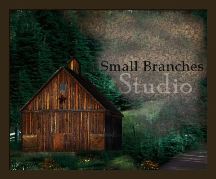Looking back over my childhood a few gifts truly changed how I envision life: a pair of A
ppalachian clothespin dolls and a book of Willa Cather's short stories from my aunt, and a theatre experience planned by my grandmother. Other holidays came and went, in a blur of Christmas trees, the angel-hair drench tree of my grandfather's house, the children's tree downstairs at an aunt and uncle's home, the white tree displayed in the front window, the year my brother and sister and I decorated a real spruce tree with toys and while my parents were away only for it to crash down in the middle of the night. Now, I think of gifts for others and remember, too.
Something about the plain, tiny-featured dolls that evokes my childhood, beyond that particular year Christmas. I recall autumn weekends at Spring Mill, gathering sticks for a fire to roast marshmallows, the visits to the pioneer village, the cold water from the spring trickling by mossy banks. The pioneer
apothecary shop with jars full of herbs and remedies, the
bonnet-topped ladies in long dresses strolling in and out with their baskets, the stonewalled
garden with the
vegetables laid out in neat rectangles. The tidy utility of rooms meant for living, cooking, around a stone fireplace. The smell of woodsmoke on a clear night always made me imagine that pioneer life, those wooden cabins, and the damp chill of morning seeping in through the chinks as the fire burns low. Making do. My aunt had lived in such a cabin, north in Canada, to me a land of mystery and bears. The clothespin dolls now stand guard over my collection of antique books; they still make me smile.
The book of Cather stories too, brings to mind the pioneer days and the
juxtaposition with urban society. The heartbreak and pride of working the land, the
apparent ease of city life, and the squalor and hardship which was too often the true experience of the immigrant, the pioneer, the fool-hardy soul who hoped for more than the earth or the city was willing to give. Just south of where I grew up, there is a historical marker for
Pigeon's Roost, where settlers were massacred men, women and children all. I grew up with a sense of being connected to this history, to the sense of adventure and possibility inherent in moving on and trying a new life elsewhere.
The practical side of me knew that pioneer life was hell on women, the old graveyards are full of babies, and women who died bearing them, the tin-types show women worn to a nubbin, aged beyond their years with sickly children peering out from behind their skirts. In Kansas and elsewhere on the prairie , they made lives out of the dirt, living in
sod houses, trying to break the hills before the flint in the hills broke their will to try. It was cold in Kansas last year after the ice-storm, without electricity, in a modern home equipped with a fireplace--bone cold. Imagine an entire winter, with no light, little heat, tucked like a mole in the side of the hill. Imagine the damp, the heat escaping each time someone passes in or out, the impossibility of clean. The practical side understands why Paul, of "Paul's Case" made the fateful decision to run to the city, to the lights, the theatre, the warmth and abundance.
Tickets to the theatre,too, were a good gift: the lights and the wonder. The memories of dressing up, of occasion. That particular Christmas I was four, with a red long dress trimmed in white lace holding my grandmother's hand, following along, mesmerized by the width and the breadth of theatre, by the people gathered there to wait in the dark, for the storybook brought to life on the stage. There, then, anything was possible.




